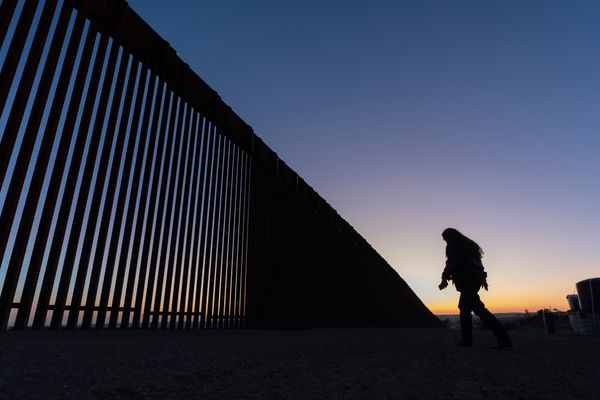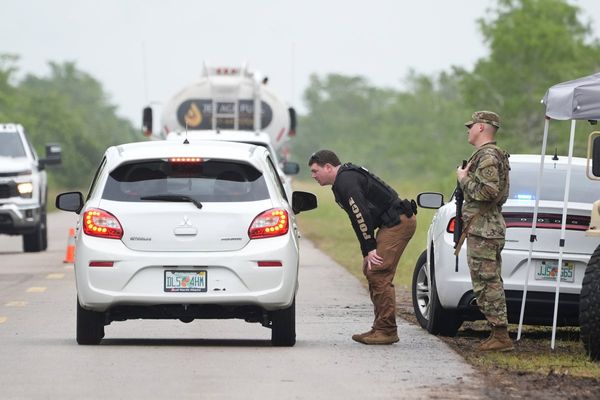
Tesla CEO Elon Musk said that the automaker would put a Robotaxi on the streets of Austin last month, and it did exactly that—with some caveats.
It's a limited deployment for now, and open only to influencers and Tesla-friendly folks. And there's still a human in the front passenger's seat, which is great for playing it safe, but not so great when trying to instill confidence that its self-driving product is ready to drive by itself. Maybe that's why major automakers like Ford are instead putting faith in tried-and-true tech like LIDAR.
Welcome back to Critical Materials, your daily roundup for all things electric and tech in the automotive space. In today's edition, Ford won't be partnering with Tesla for FSD tech any time soon, Tesla's second-quarter delivery numbers are coming up, and the Feds want to kill the EV tax credit even sooner than anticipated. Let's jump in.
30%: Ford Says LIDAR Is 'Mission Critical' In Solving Self-Driving

Remember when Musk said that Tesla was in talks with major automakers about licensing its Full Self-Driving autonomy stack? It seems that Ford may have been one of those automakers, as made evident when Walter Isaacson—the author who published a biography about Elon Musk in 2023—interviewed Ford CEO Jim Farley last week. However, Ford isn't likely to bite on Tesla's tech anytime soon.
Farley made it clear that Ford felt that LIDAR tech used by other robotaxi companies like Waymo is just way-mo better (I'll see myself out) than Tesla's vision-based system. In fact, Farley even called LIDAR "mission critical" to Ford's position on autonomy, which is pretty much as close as you can get to a public "yeah, no thanks, we're good" without hurting feelings.
Here's what Farley said at the Aspen Ideas Festival, as quoted by Fortune:
Ford, the number three automaker in the U.S., which plans to work with partners to incorporate self-driving technology into its future vehicles, does not seem likely to license Tesla’s tech anytime soon, based on Farley’s comments on Friday.
“When you have a brand like Ford, when there’s a new technology, you have to be really careful,” Farley said at the Aspen Ideas Festival on Friday. “We really believe that LiDAR is mission critical,” Farley said, referring to the laser sensors used by companies like Waymo.
[...] “To us, Waymo,” Farley said. He pointed out that both Waymo, owned by Google-parent Alphabet, and Tesla “have made a lot of progress” on self-driving, and Farley acknowledged that he has had conversations with Elon Musk. But he stated that Ford considered LiDAR to be an important part of the picture, noting that “where the camera will be completely blinded, the LiDAR system will see exactly what’s in front of you.”
Currently, Ford offers a hands-off (but still supervised) Level 2 semi-autonomous system in its new vehicles. Dubbed BlueCruise, it works on major pre-mapped highways and relies on more than just basic camera sensors to help steer and brake. But much like Tesla, General Motors, and just about every other automaker out there, Ford knows that personal autonomy—as GM CEO Mary Barra calls it—will eventually be common in consumer cars.
Ford has since been working with both internal teams and partners to develop its own approach to autonomy. Keep in mind that it once had shoveled $1 billion into the cash burn that was Argo AI (a joint venture with Volkswagen) and still has plans to further advance its own existing systems, however, Ford no longer has plans to develop any tech that would allow its vehicles to operate at Level 4 or above. Instead, Ford plans to work with companies that have already solved self-driving.
Even if Tesla does prove itself to be reliable with its robotaxi rollout, Ford seems to be uninterested without other safeguards like LIDAR. And given that Musk has called LIDAR a "crutch" and "fool's errand," it's unlikely that Tesla will budge any time soon.
60%: Tesla Set To Release Delivery Numbers Tomorrow. Analysts Expect A Bloodbath

Tesla's second quarter delivery numbers are expected to drop tomorrow, and let's just say that Wall Street's expectations are not high.
Here's the basic setup: investors are bracing for back-to-back quarterly delivery declines. Predictions from analysts are all over the board. Some are anticipating Tesla's deliveries could be as high as 391,000, while others are more pessimistic and expect numbers to be as low as 355,000.
For reference, Tesla delivered about 444,000 cars in the second quarter of last year, which means the most skeptical analysts predict nearly a 21% drop year-over-year. Bloomberg, the most optimistic of them all, still puts Tesla at a 12% drop. Either way, if either number is even remotely close, it would represent one of Tesla's largest quarterly declines ever—and that's no matter how you look at it.
Where's the pain coming from? Take your pick:
CEO Elon Musk's politics have done Tesla in. First and foremost, Musk has forced a large majority of Tesla's followers to cut ties following his political meddling in recent months. While it's clear Musk is now backpeddling and speaking out against the U.S. presidency and the Republican party's push for the Big Beautiful Bill, it's a little too late, especially in Europe, where many folks have all but sworn off the brand.
Stagnant models aren't enough to bolster sales. Tesla was once a shiny new toy that people believed could drive them halfway across the country. Now? There are plenty of other EVs out there, meaning that consumers now have options. Tesla's mild facelifts and lack of new models (excluding the Cybertruck) make the brand feel mundane, and that's where legacy automakers are playing catch-up.
China's EV market is moving on. China is one of Tesla's biggest markets, but it's also one of the most competitive. Recently, brands like BYD, Nio, Geely and Xiaomi have made headway in producing affordable cars that have drawn in consumers faster than ever. This has made foreign players (like Tesla) less attractive to consumers and Tesla's sales aren't growing to support the faltering demand elsewhere in the world.
If the Feds manage to kill off the EV tax credit (more on this next) as anticipated, Tesla's entire year could be riding on Q2. That's not a great sign, considering that analysts are all looking away awkwardly as the world awaits its results this week.
To make matters worse for Tesla investors, the automaker's stock already fell by nearly 5% in pre-market trading as President Donald Trump posted a long rant about Musk and Tesla on Trump's social media platform, Truth Social:
Elon Musk knew, long before he so strongly endorsed me for president, that I was strongly against the EV mandate. It is ridiculous, and was always a major part of my campaign. Electric cars are fine, but not everyone should be forced to own one.
Elon may get more subsidy than any human being in history, by far, and without subsidies, Elon would probably have to close up shop and head back home to South Africa. No more rocket launches, satellites, or electric car production, and our country would save a fortune.
Perhaps we should have DOGE take a good, hard, look at this? Big money to be saved!!!
But we can't ignore that some analysts are also looking past Tesla's core automotive business and instead considering it "more" than a car company. CNBC's Jim Cramer recently cut the automaker some slack, noting that he's putting his faith in Tesla's ability to execute the other growing areas of is business (like AI, robotics and its new robotaxi program). He also spoke highly of the confidence that Nvidia CEO Jensen Huang has in Tesla.
If there's anything worth realizing, it's that Tesla's stock pricing seems to ride on emotion more than sense. Not only is Musk himself baked into the intrinsic value of Tesla's market price, but so are Tesla's future offerings. We'll see if Tesla's deliveries line up with expectations later this week and how that might affect the stock price.
90%: Automakers Are Freaking Out Because The Senate Wants To Killing Off The EV Tax Credit In September

If you've been kicking the can down the road on that new EV purchase, you might want to move fast. The feds were originally taking aim at killing off the $7,500 EV tax credit by the end of the year, however, the most current language of the Senate version of the Big Beautiful Bill is instead aiming at eliminating the federal EV tax credit by Sept. 30 instead.
It's hard to keep track of who is proposing what, especially as language in the bill is being subtly tweaked and introduced by both the House and the Senate. It went from being killed off by the end of the year, to 180 days after signing, and now the latest language is throwing the credit to the wolves with what is likely just two months' notice.
Automotive News brings a short and sweet summary of what's being voted on:
The Senate is planning to once again accelerate the end of the $7,500 new electric vehicle tax credit in the proposed legislation, this time to Sept. 30, 2025.
A prior version of the Senate budget bill text would have eliminated the tax credit 180 days after passage. A House version of the budget bill would have eliminated the credit at the end of the year.
[...] The new Senate text would also eliminate the $4,000 used EV tax credit on Sept. 30 and end penalties for automakers that fail to meet corporate average fuel economy standards.
Manufacturers, suppliers, dealers and just about everyone in between are expected to be affected as more than 140,000 EVs could soon be collecting dust on dealer lots.
Needless to say, manufacturers are asking for more time at the very least. The National Automobile Dealers Association has urged Congress—who ultimately needs to sign off on the final version of the Senate bill before it heads to the president's desk—to make sure that it includes a more reasonable transition period before eliminating incentives.
100%: What Happens To EVs If The Bill Passes?

From a forward-looking perspective, automakers are undoubtedly freaking out, especially if they have less than a single quarter to unload as many EVs as possible before the tax credit is gone, deals evaporate and prices go up.
So what are your feelings as this situation evolves? Take some time to vent and let me know what you think will happen in the near and long-term future of EVs down in the comments.







